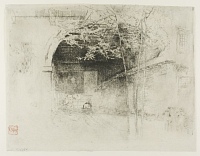Traghetto | ||
| Number: | 231 | |
| Date: | 1879/1880 | |
| Medium: | etching and drypoint | |
| Size: | 240 x 311 mm | |
| Signed: | butterfly at lower left (1-2); replaced with new butterfly (3-final) | |
| Inscribed: | no | |
| Set/Publication: | no | |
| No. of States: | 4 | |
| Known impressions: | 7 | |
| Catalogues: | K.190; M.187 | |
| Impressions taken from this plate (7) | ||
KEYWORD
arch, canal, courtyard, gondola, ferry, lantern, man, palace, , people, tree, worker.
TITLE
There are minor variations in the title, as follows:
'Traghetto' (1891, Whistler). 2
'The Traghetto' (1902, Edward Guthrie Kennedy (1849-1932)). 3
'The Traghetto. No. 1' (1909, Howard Mansfield (1849-1938)). 4
'The Traghetto, No. 1' (1910, E.G. Kennedy). 5
'Traghetto' is Whistler's original title. This etching can be confused with the later version of the scene, The Traghetto [233], which is unavoidable.
'Traghetto' (1891, Whistler). 2
'The Traghetto' (1902, Edward Guthrie Kennedy (1849-1932)). 3
'The Traghetto. No. 1' (1909, Howard Mansfield (1849-1938)). 4
'The Traghetto, No. 1' (1910, E.G. Kennedy). 5
'Traghetto' is Whistler's original title. This etching can be confused with the later version of the scene, The Traghetto [233], which is unavoidable.
2: Whistler to F. Keppel, 13 May 1891, GUW #13068.
3: Kennedy 1902 (cat. no. 368).
4: Mansfield 1909 (cat. no. 187).
5: Kennedy 1910 (cat. no. 190).
DESCRIPTION
In the centre is a broad arch, the entrance to a dark passageway underneath a building, leading to a canal. The passage is roofed with beams, and lit, towards the far end, by a lantern. A seated man can be seen beyond the passage, at the left, and the canopy of a gondola on the right. In the foreground, in a courtyard, three slender trees are growing. In the wall to left of the arch is a window with lozenge-shaped panes, and at the right are two windows. There are men in the right foreground. For later changes, see STATES.
SITE
The
site is the courtyard of the Ca’ da Mosto, north of the
Rialto bridge in the district of Cannaregio, Venice, Italy. 6 This view, drawn accurately on the copper plate, is reversed, as usual, in the print. This is the first version of The Traghetto [233].
6: Grieve 2000, pp. 83–84.

